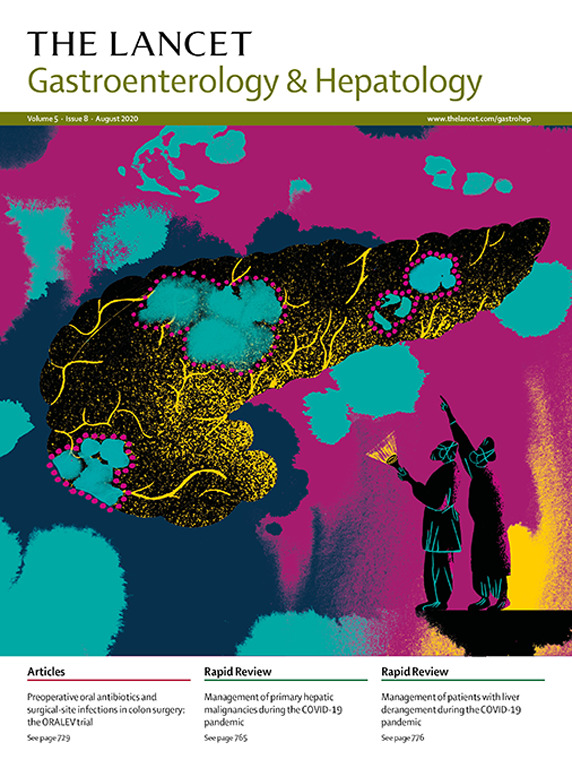Endoscopist deskilling risk after exposure to artificial intelligence in colonoscopy: a multicentre, observational study
IF 38.6
1区 医学
Q1 GASTROENTEROLOGY & HEPATOLOGY
引用次数: 0
Abstract
Background
It is not known if continuous exposure to artificial intelligence (AI) changes endoscopists' behaviour when conducting colonoscopy. We assessed how endoscopists who regularly used AI performed colonoscopy when AI was not in use.Methods
We conducted a retrospective, observational study at four endoscopy centres in Poland taking part in the ACCEPT (Artificial Intelligence in Colonoscopy for Cancer Prevention) trial. These centres introduced AI tools for polyp detection at the end of 2021, after which colonoscopies had been randomly assigned to be conducted with or without AI assistance according to the date of examination. We evaluated the quality of colonoscopy by comparing two different phases: 3 months before and 3 months after AI implementation. We included all diagnostic colonoscopies, excluding those involving intensive anticoagulant use, pregnancy, or a history of colorectal resection or inflammatory bowel disease. The primary outcome was change in adenoma detection rate (ADR) of standard, non-AI assisted colonoscopy before and after AI exposure. Multivariable logistic regression was done to identify independent factors affecting ADR.Findings
Between Sept 8, 2021, and March 9, 2022, 1443 patients underwent non-AI assisted colonoscopy before (n=795) and after (n=648) the introduction of AI (median age 61 years [IQR 45–70], 847 [58·7%] female, 596 [41·3%] male). The ADR of standard colonoscopy decreased significantly from 28·4% (226 of 795) before to 22·4% (145 of 648) after exposure to AI, corresponding with an absolute difference of –6·0% (95% CI –10·5 to –1·6; p=0·0089). In multivariable logistic regression analysis, exposure to AI (odds ratio 0·69 [95% CI 0·53–0·89]), male versus female patient sex (1·78 [1·38–2·30]), and patient age ≥60 years versus <60 years (3·60 [2·74–4·72]) were the independent factors significantly associated with ADR.Interpretation
Continuous exposure to AI might reduce the ADR of standard non-AI assisted colonoscopy, suggesting a negative effect on endoscopist behaviour.Funding
European Commission and Japan Society for the Promotion of Science.内镜医师在结肠镜检查中暴露于人工智能后降低风险:一项多中心观察性研究
目前尚不清楚持续接触人工智能(AI)是否会改变内窥镜医生在进行结肠镜检查时的行为。我们评估了经常使用人工智能的内窥镜医生在不使用人工智能时如何进行结肠镜检查。方法:我们在波兰的四个内镜中心进行了一项回顾性观察性研究,参与了ACCEPT(人工智能在结肠镜检查中用于癌症预防)试验。这些中心在2021年底引入了用于息肉检测的人工智能工具,之后根据检查日期随机分配在有无人工智能辅助下进行结肠镜检查。我们通过比较人工智能实施前3个月和实施后3个月两个不同阶段来评估结肠镜检查的质量。我们纳入了所有诊断性结肠镜检查,排除了那些涉及强化抗凝剂使用、妊娠、结肠切除史或炎症性肠病的患者。主要观察结果为人工智能暴露前后标准、非人工智能辅助结肠镜腺瘤检出率(ADR)的变化。采用多变量logistic回归分析确定影响不良反应的独立因素。结果:在2021年9月8日至2022年3月9日期间,1443例患者在引入人工智能之前(n=795)和之后(n=648)接受了非人工智能辅助结肠镜检查(中位年龄61岁[IQR 45-70],女性847例[58.7%],男性596例[41.3%])。标准结肠镜不良反应从暴露于人工智能前的28.4%(795例中的226例)显著下降至暴露于人工智能后的22.4%(648例中的145例),对应的绝对差异为- 6.0% (95% CI为- 10.5 ~ - 1.6;p = 0·0089)。在多变量logistic回归分析中,暴露于人工智能(比值比0.69 [95% CI 0.53 ~ 0.89])、患者男女性别(比值比1.78[1.38 ~ 2.30])、患者年龄≥60岁与≤60岁(比值比3.60[2.74 ~ 4.72])是与不良反应显著相关的独立因素。持续暴露于人工智能可能会减少标准非人工智能辅助结肠镜检查的不良反应,这表明对内窥镜医师的行为有负面影响。资助欧洲委员会和日本科学促进会。
本文章由计算机程序翻译,如有差异,请以英文原文为准。
求助全文
约1分钟内获得全文
求助全文
来源期刊

Lancet Gastroenterology & Hepatology
Medicine-Hepatology
CiteScore
50.30
自引率
1.10%
发文量
0
期刊介绍:
The Lancet Gastroenterology & Hepatology is an authoritative forum for key opinion leaders across medicine, government, and health systems to influence clinical practice, explore global policy, and inform constructive, positive change worldwide.
The Lancet Gastroenterology & Hepatology publishes papers that reflect the rich variety of ongoing clinical research in these fields, especially in the areas of inflammatory bowel diseases, NAFLD and NASH, functional gastrointestinal disorders, digestive cancers, and viral hepatitis.
 求助内容:
求助内容: 应助结果提醒方式:
应助结果提醒方式:


